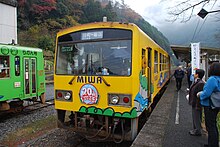Nishikigawa Seiryū Line


The Nishikigawa Seiryū Line (錦川清流線, Nishikigawa Seiryū-sen, "Nishiki River Clear Stream Line") is a Japanese railway line connecting Kawanishi and Nishikichō stations, all within Iwakuni, Yamaguchi. As the name suggests, the line parallels the Nishiki River. This is the only railway line operates by Nishikigawa Railway (錦川鉄道, Nishikigawa Tetsudō), a third-sector railway company which took over a former former West Japan Railway Company (JR West) line in 1987. The line was proposed to be extended to Nichihara via JR's Yamaguchi Line, but this was not completed (see History section below). The company also operates bus lines and a travel agency.
Basic data
- Distance: 32.7 km (20.3 mi)
- Gauge: 1,067 mm (3 ft 6 in)
- Stations: 13
- Track: single
- Electric supply: not electrified
- Railway signalling:
- Kawanishi — Kita-Gōchi: Automatic
- Kita-Gōchi — Nishikichō: Simplified automatic
Stations
- All trains operate through to West Japan Railway Company (JR-West) Gantoku Line beyond Kawanishi to Iwakuni.
| Name | Distance (km) | Connections | Location | |
|---|---|---|---|---|
| Iwakuni | 岩国 | 0.0 | Sanyō Main Line | Iwakuni, Yamaguchi |
| Nishi-Iwakuni | 西岩国 | 3.7 | Gantoku Line | |
| Kawanishi | 川西 | 5.6 | Gantoku Line | |
| Seiryū-Shin-Iwakuni | 清流新岩国 | 9.5 | Sanyō Shinkansen (Shin-Iwakuni) | |
| Shuuchi-Kasagami | 守内かさ神 | 11.0 | ||
| Minami-Gōchi | 南河内 | 14.2 | ||
| Yukaba | 行波 | 16.8 | ||
| Kita-Gōchi | 北河内 | 19.5 | ||
| Mukuno | 椋野 | 23.3 | ||
| Naguwa | 南桑 | 26.4 | ||
| Seiryu Miharashi | 清流みはらし | 28.1 | ||
| Nekasa | 根笠 | 29.1 | ||
| Kawayama | 河山 | 33.5 | ||
| Yanaze | 柳瀬 | 36.6 | ||
| Nishikichō | 錦町 | 38.3 | ||
History
The Gannichi Line (岩日線, Gannichi-sen) opened to Kawayama on 1 November 1960, operated by Japanese National Railways (JNR), and was extended to Nishikichō in 1963.[1][2] Construction of the proposed extension to Nichihara on the Yamaguchi Line commenced in 1967, and about 50% of the roadbed had been completed when construction was abandoned in 1980.
The Nishikigawa Railway was established on 1 April 1987, renaming and taking over operations of the line from 25 July of the same year.[1]
See also
References
This article incorporates material from the corresponding article in the Japanese Wikipedia
- ^ a b Terada, Hirokazu (19 January 2013). データブック日本の私鉄 [Databook: Japan's Private Railways]. Japan: Neko Publishing. p. 167. ISBN 978-4-7770-1336-4.
- ^ Ishino, Tetsu; et al., eds. (1998). 停車場変遷大事典 国鉄・JR編 [Station Transition Directory – JNR/JR] (in Japanese). Vol. I. Tokyo: JTB Corporation. p. 176. ISBN 4-533-02980-9.
External links
- Official website (in Japanese)
